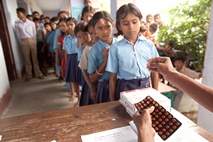 By Professor Sir Roy Anderson (London Centre for Neglected Tropical Disease Research), and Sunit Bagree (Partnership for Child Development, Imperial College London)
By Professor Sir Roy Anderson (London Centre for Neglected Tropical Disease Research), and Sunit Bagree (Partnership for Child Development, Imperial College London)
The criticisms of the European response to Ebola have been
manifold, with the death toll from the epidemic likely to be
far higher than current official figures, and the social and economic legacy of the crisis in the most affected countries predicted to be very painful. But given Europe’s lack of engagement with neglected tropical diseases (NTDs), it is perhaps not that surprising.
There are no alarmist Hollywood movies about the 17 diseases which can be grouped together by the term NTDs. Yet their cumulative impact on the over
1.4 billion people who are affected by them is every bit as devastating as any fictional outbreak.
NTDs are a global problem that require a global response. In 2012 the likes of Bill Gates, the UK and US governments, big pharma and the UN agencies came together to pool resources and issue the
London Declaration on NTDs, to control and eliminate these diseases by 2020.
Yet aside from the UK, other European Union member states, along with the European Commission (EC), are very much on the margins of this global movement. This is peculiar considering the EC’s
strong commitments to global health and the fact that no other continent can match Europe’s concentration of Tropical Medicine research centres.

A new
policy paper from Imperial College London’s
Partnership for Child Development highlights the EC’s lack of engagement concerning two NTDs that are
particularly prevalent amongst schoolchildren, namely schistosomiasis and soil-transmitted helminths (STH). These two treatable NTDs cause pain, stunted growth, anaemia and lower cognitive skills in over
400 million school children worldwide.
Periodic drug treatment for children in schools – known as school-based deworming – represents a highly strategic approach to tackling these two diseases because it is cheap, effective and can be delivered at great scale. For example, over 17 million children were dewormed in the Indian state of Bihar in 2011 for less than 25 rupees (25 pence) per child.
The results are very impressive. For instance,
research associated with the Primary School Deworming Programme in Kenya demonstrated that school-based deworming increased school attendance by 7.5% and led to higher wage earnings of over 20% in adulthood. Integrated programmes that deliver deworming, water, sanitation and hygiene (WASH), health education and nutrition interventions are potentially even more cost-effective.
This is not entirely alien territory for the EC. The organisation has
officially recognised the need to ‘promote children’s health at school’. And under its previous research programme, known as Framework Programme 7, approximately
€24.6 million (£19.4 million) was dedicated to tackling schistosomiasis, STH and two other NTDs (admittedly a tiny amount compared to the EC’s investment in, for example, HIV/AIDS, malaria or tuberculosis).
However, there have been few genuine policy commitments made by the EC in the area of NTDs. The low prioritisation of NTDs within the EC’s health and development agenda is underlined by the fact that NTDs have not been included in the first period (2014-2015) of the EC’s new research programme, known as
Horizon 2020.
With its financial resources, technical capacity and global network, the EC can and should play a central role in the global effort to combat NTDs. Despite the success of school-based deworming programmes, certain research and development (R&D) and operational challenges exist, which the EC is well placed to help address.
Health-related R&D is a
major strength of many European countries, which the EC can leverage in the fight against NTDs. Specific EC mechanisms such as the
European and Developing Countries Clinical Trials Partnership have the potential to contribute to the development of new products for NTDs, as well as to enhance national research capacities in developing countries.
On the operational side, the distribution of drugs can be problematic in some low- and middle-income countries. The EC can assist national governments to make informed requests to the World Health Organization for
donated drugs, and also help to remove bottlenecks in drug distribution within countries by facilitating effective collaboration between different ministries.
If it is to rise to this task, the EC requires a clear policy on NTDs, and it must ensure that the control and elimination of schistosomiasis and STH are integrated into its education, nutrition and WASH strategies and interventions. In addition, the EC needs to work with the WHO and national governments to prepare and implement integrated plans for NTD control that markedly include school-based deworming programmes.
After a slow start Europe is now
coordinating its response to Ebola. The hope must be that Europe will also start focusing its expertise and resources for the sake of the billion plus people whose lives are damaged by other, less headline-friendly, diseases.

